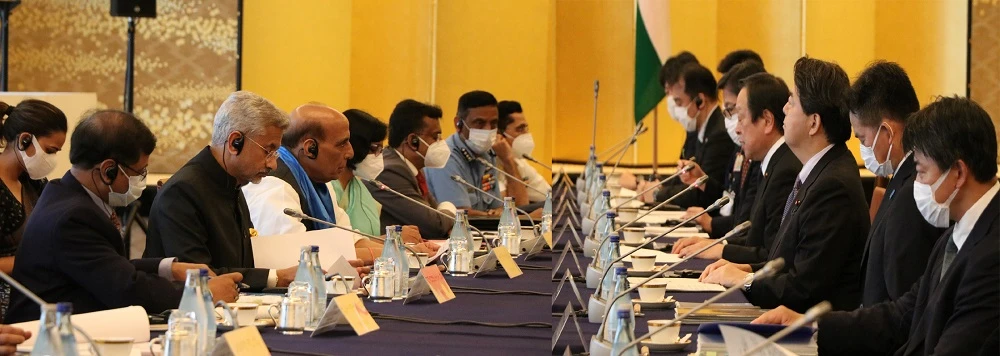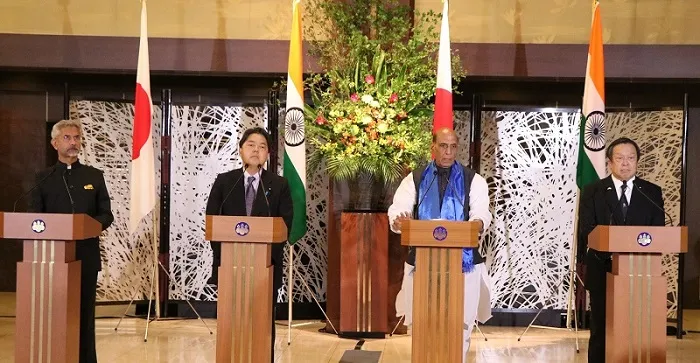Exchanging views on the situation in Ukraine and regional security scenario – including the East and South China Seas, North Korea, and South Asia – the defence and foreign ministers of India and Japan on Thursday highlighted their commitment to a “common strategic goal of achieving a free and open Indo-Pacific” that is inclusive and resilient, based on the rule of law and free from coercion.
In the Second India-Japan 2+2 Foreign and Defence Ministerial Meeting held in Tokyo which lasted approximately two hours, Defence Minister Rajnath Singh and External Affairs Minister S Jaishankar also acknowledged Japan’s resolve to strengthen its defence capabilities through the formulation of a new National Security Strategy.
India’s response came as Japan, in a clear message to China, detailed its resoluteness to examine all options necessary for national defence, including so-called “counterstrike capabilities”, in its determination to fundamentally reinforce the country’s defence capabilities within the next five years and secure substantial increase of Japan’s defence budget needed to effect it.
Japanese Foreign Minister Yoshimasa Hayashi and Defence Minister Seiichi Hamada hailed the “dramatic expansion” of cooperation between the two countries in the fields of security and defence and shared the view that bilateral and multilateral joint exercises will continue to be implemented in a multi-layered manner.

In addition, Tokyo also confirmed that the two countries will cooperate closely and jointly lead the international community in anticipation of their respective presidency of the G7 and G20 next year.
New Delhi highlighted that India and Japan are two nations committed to promoting a rules-based order, ensuring respect for international law and norms, and safeguarding the global commons.
Jaishankar also admitted that the meeting takes place in the backdrop of a complicated global environment in the aftermath of the Covid pandemic with conflicts and climate events having further aggravated the global economic situation, creating deep anxieties in respect of energy and food security.
“In the face of such challenges, the case for India and Japan to collaborate more closely on foreign policy and security questions has become even stronger,” said the External Affairs minister after the 2+2 meeting.
Expressing satisfaction with the ongoing cooperation in the areas of Unmanned Ground Vehicle (UGV)/Robotics, Defence Equipment and Technology Cooperation, India and Japan are also working together on cybersecurity, 5G deployment and critical and strategic minerals.
“These were part of the agenda of our deliberations today,” said Jaishankar.
A Memorandum of Understanding (MoU) on cybersecurity was signed during Japanese Prime Minister Fumio Kishida’s visit to India in March, following which the Japan-India cyber talks were held in June.
In a joint statement released later, the ministers also reiterated their strong support for ASEAN’s unity and centrality and their full support for the ‘ASEAN Outlook on the Indo-Pacific (AOIP)’.
Stating that they will cooperate towards the common goal of realising a ‘Free and Open Indo-Pacific’ (FOIP), the four ministers reaffirmed that unilateral change of the status quo by force is not permitted in any region, not just the Indo-Pacific and that it is necessary to seek a peaceful settlement of disputes based on international law.
“Our Special Strategic and Global Partnership reflects interests and increasingly our footprint that extend well beyond the immediate region. In growing our own ties and working with other partners, we are both guided by shared values and common principles. We have a particular responsibility for ensuring a free, open, inclusive and prosperous Indo-Pacific,” said Jaishankar.
Also Read: India and Japan to hold their first air combat exercise soon




















